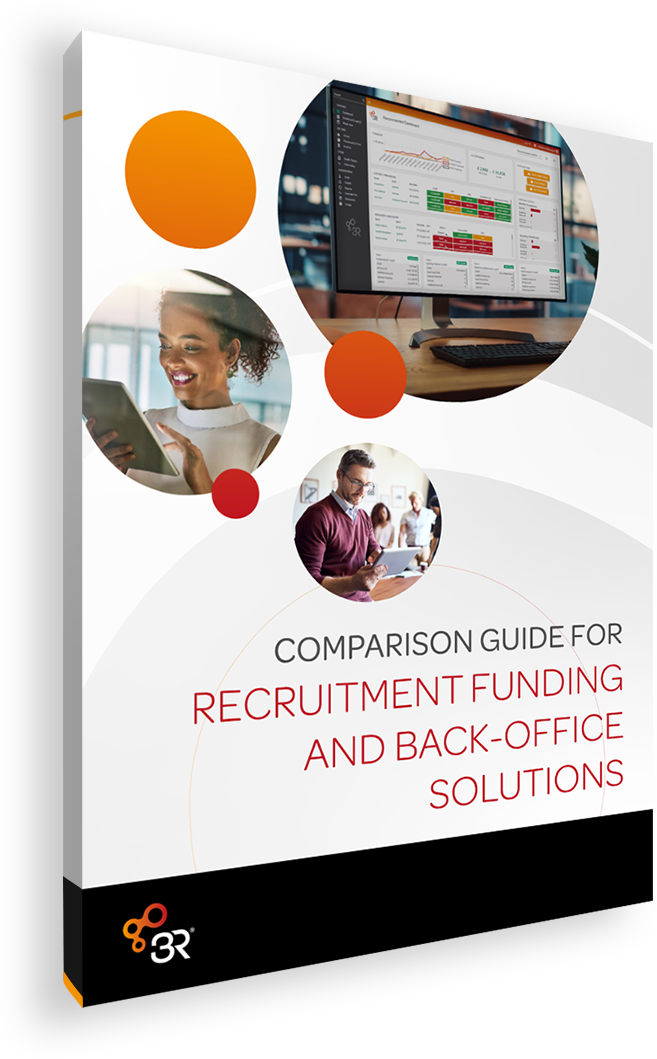Top Tips for effective contractor management

For passionate recruiters, the fast-paced nature of contract recruitment presents a great opportunity for reoccurring revenue and compounded growth allowing recruitment business owners to quickly scale-up!
As with all things, there are some best practices for contractor management to learn, especially if you previously focused on perm or are new to contract. However, the basics of recruitment all remain the same – question effectively, listen accordingly, resource, make suitable matches, and work to deadlines.
Managing contractors in your chosen niche sector is a continuous cycle of identifying the right skills to match with current or up-coming vacancies. By facilitating a positive experience for your clients and contractors, you will develop a strong network, the management of these relationships and ultimately making great placements is what creates a successful contract recruiter.
Recruitment technology has evolved significantly to automate various aspects of recruitment process, which makes it easier to handle contractor management. From timesheet management, payment scheduling, to ensuring compliance, you will be better equipped to control and keep on top of your network.
To help you understand the vital steps of effectively managing your contractors, we’ve broken down and outlined the contractor management process in three sections:– the before, during, and after of contract recruitment.

Understand your Contract Workforce
The key to becoming an effective contract recruiter begins with the understanding you build about your contractor workforce and the knowledge you have of your niche industry. The fast-paced nature of contract recruitment means you'll need to be on the front foot and have awareness of:
- Who your contractors are?
- Where they are?
- What roles they’re in?
- When does their current contract placement finish?
- What other options do you have to offer or know are coming up soon?
- What would they leave for?
Finding and prioritising exclusive, golden contract opportunities is important for any recruiter but being able to make great matches between the opportunity and a contractor is a crucial part of the process. Placing the right people in the right positions will help you build a reliable and trustworthy reputation in the long run.
Contract recruitment moves fast and requirements can change quickly. So being knowledgeable about your industry - understanding peak times, seasonal or market trends, possible upcoming major projects and being close your contractor workforce gives you greater control, awareness and foresight on your ability to source and make placements. Focusing on your expertise in these areas is crucial.
Building your network of contractors
When it comes to building a strong contractor network, your priority should be to understand the distinct skills and expertise, needs and wants of your individual contractors. Understanding their expectations and finding roles that best meet their requirements, i.e. locations, pay, flexibility, will ensure the contractor is more likely to perform to a better standard. The priorities and motivation of a contract candidate vary greatly from those of perm candidates. The company culture, company benefits, relocation and career packages can be less of concern in the consideration process.
There is an opportunity for proactive recruiters to build long-lasting relationships and, if close enough to your clients, forecast up-coming opportunities and matches within your contractor workforce, this will all-round create a better candidate and client experience. This ability can quickly become the best asset to your recruitment business. Maximising the lifetime value of each contractor and giving you an edge over your competitors.
If you're new to contract recruitment, the time sensitive nature of it may be a worry. Knowing your contractor pool well and their upcoming availability can help you meet tight deadlines, quickly fulfilling client needs with the best matches - also helping you address any issues promptly too.
Knowing your niche industry
Staying on top of industry events, trends, and issues is an important part of building control over your contract desk. Using this knowledge of an industry can forge your reputation as an expert, support quick, well-thought out decisions and help you find out about valuable new projects and up-coming vacancies.
For instance, recruiters have many candidate CVs at any given time, the ability to look at a contractor candidate’s CV and recognise important industry clients, emerging skill sets, and qualifications is crucial to recognising industry shifts and trends, as well as the contractor's value and suitability for opportunities.
A key part of understanding the industry comes from the network of clients you build too. Nurturing mutually beneficial relationships with your clients builds retention, which is a foundation for long-term success in contractor book management. Once you build a stable network of clients, and work hard to deliver best practice relationship management, more opportunities find you.
Other factors to consider
Working with contractors comes with its own distinct set of laws and legislation, with industry shifting changes being made regularly. Providing security and compliance within the changing landscape of contract work is an important part of establishing a favourable contractor experience.
For example, understanding and clarifying the IR35 status of the contractor is necessary to reducing risk for you and your contractor and clear contracting with your clients will ensure compliant agreements where any risks are addressed and mitigated from the beginning of your relationships.

During a Contract
The diligence you show in the initial work prior to a contract being set, by carefully creating matches between your contractors and the roles you have, can help to minimise the risk of any surprises. Whether that be contractors leaving a job for another role without notifying you or a client terminating a contract without your knowledge.
Once a contractor is placed, the role a recruiter plays is one of a consultative guide. The key behind this process is gathering feedback by keeping in regular contact with the contractor and client.
For a proactive recruiter, the “during” phase of the contract, gives you a great opportunity to gather valuable information about your contractor, and the company they’re employed with. For instance, you can find out if the company has other vacancies that you could potentially fill or find out more about the contractor’s preferences.
There are various approaches recruiters take during this phase, two common ones being – pre-emptive and opportunistic.
Pre-emptive
A recruiter may take a pre-emptive approach to proactively avoid and mitigate any surprises. This approach is dependent on actively seeking feedback from both the client and contractor to understand their individual perspectives and the wider context of their partnership.
Maintaining consistent communication and building rapport with your contracts can reveal a lot about how satisfied the contractor is feeling within the client company and role that they’re in. If there are any issues, then you can provide support or recognise early on that they are likely to leave the role, giving you the opportunity to find a replacement contractor for the client.
Whereas with the client, a pre-emptive approach means keeping track of their opinion and attitude towards the contractor and their fit for the role. If the client seems to be dissatisfied, you have the opportunity to rectify the situation proactively by finding a replacement.
Opportunistic
A recruiter can also take an opportunistic approach throughout the “during” phase of the contract. This is where it is important to develop a good relationship with your contractor as they are your eyes and ears within the company they are working for and within the industry.
You can then gather valuable company and market information that can benefit you in growing your contract desk. Any new roles opening up within the company, how many other contractors they have, and what roles they are in and have been offered.
Build your network further by connecting and communicating with the other contractors that work in the company. Developing relationships with these contractors can build your network of candidates and give you access to insights about other companies.
Often contractors work for multiple agencies at a time, which can provide you with an opportunity to find more roles. Find out what other roles they had been offered and contact those companies.
Finding your style
The approach you take is dependent on your own management preferences. Depending on the type of relationships you’re able to create with your contractors and clients, you can use a combination of a pre-emptive and opportunistic approach.
For passionate recruiters, putting candidates in their ideal jobs whilst helping fill vacancies for clients is key. Both approaches require you to be active in your communication. The more questions you ask, the more knowledge you build up.
It’s worth noting here that you need to do this over time and carefully. No party wants to feel hounded by their recruiter, so it's crucial to be able to ‘read’ the subtext and not over-do it!
When the contract ends...
The "after" phase is all about continuing the relationships you have built up and retaining a connection with your contractors and clients. You’ll notice the results of your hard work as the contracts are fulfilled as expected and contractors come to you with opportunities because they feel more comfortable working with you.
Making sure you create a contractor experience that builds long-lasting relationships is important not only for repeat contracts but for the market intelligence that the contractors can provide you with. Having an ear to the market means you’ll be earlier in finding out about new vacancies, clients, and trends.
Recruitment technology such as CRMs and back-office solutions will support you in creating a simple and easy, happy contractor experience. And with the right funding partner you can get your contractors paid correctly on time, every time. Allowing you to focus on building and maintaining your relationships with your contractors and clients, monitoring their progress and satisfaction.
Summary
Ultimately, the goal of a contract recruiter is to have as many contractors as possible working in jobs that they enjoy and are suited to, whilst retaining happy clients, that come back to you with new opportunities.
Doing the groundwork and building relationships with your contractor not only makes the process easier for you to control and manage but will benefit your business and reputation in the long run.
Although it may feel overwhelming to manage many contractors at once, back-office tech can support you with this and the reward for being thorough and engaged is improved contractor and client retention. In time, this effort can reduce your workload as you will have both contractors and clients reaching out to specifically work with you, which is a major advantage in a market as saturated as the recruitment industry.
Your network is your greatest asset and the thing that helps you stand out against your competitors. Nurture it and watch it grow!

